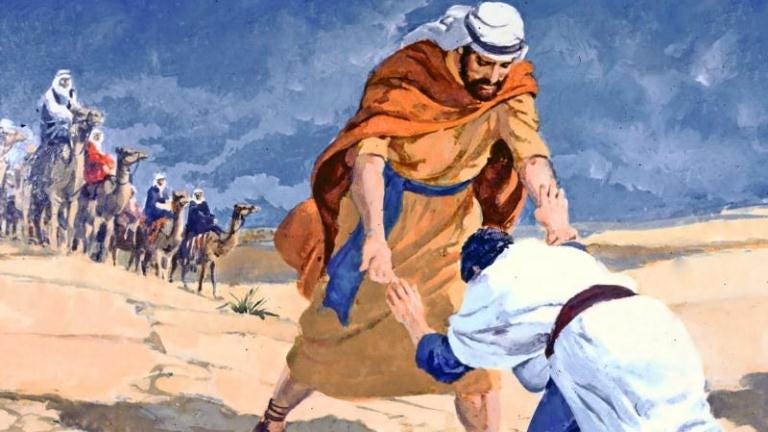Israel Isrealistic
The original Israel's approach to a dangerous scenario
It’s always great to gain insight from the weekly Torah portion. However, when people indicate that the parasha actually providentially foretells something that’s happening in that particular week, my skepticism alarm starts buzzing. And our division of the Torah into the weekly parashah is not even the original way it was done - originally the Torah was divided into much smaller parashiyot and read over a three-year cycle.
Nevertheless, as discussed in a previous post, even a cynical skeptic like me found meaning in the Hamas war starting amidst Bereishit and Noach. And it was extremely jarring that Vayera, in which Avraham is ready to sacrifice his son, occurred in the week that hundreds of thousands of families sent off their sons to fight. And it was downright freaky last week, when the women and children hostages were released, and the parasha had Yaakov asking “Give me my women and children.”
This week had Israel making difficult decisions. To what extent do we hold off on the military campaign in order to get more hostages back? To what extent do we need to take global opinion into account? What is the best way to get the hostages back and defeat Hamas?
The parashah opens with our forefather Yaakov, a.k.a. Israel, also facing a dilemma. Eisav is coming with four hundred men, presumably to attack him. What should he do?
The first thing to note is that the Torah stresses that Yaakov was afraid. It’s interesting that in my first post on this war, when I mentioned that people saying that Hashem is on our side wasn’t reassuring for me, some of my critics furiously denounced me. Yet Yaakov had Hashem’s direct promises, and he was still afraid! Clearly, it’s legitimate to acknowledge that Hashem’s assurances don’t always play out in the way that we might hope - and it’s okay to be human.
Rashi expounds that not only was Yaakov afraid for himself and his family, he was also distressed that he might have to kill others. Note how the Children of Israel, unlike other cultures, have never reveled in killing others.
So, what did Yaakov do? The Midrash notes that the Torah describes Yaakov as preparing for three approaches: humbling himself to appease Eisav, praying to God for help, and military strategies.
Rav Yuval Cherlow points out that there’s an important lesson here. These three approaches are very diverse. He prayed, but he didn’t just rely on his prayers, and nor did he send his sons to yeshiva to protect them with Torah. He did all normal material preparations. And those themselves were diverse - one was humbling himself and giving away resources, and the other was strategic manuevers.
Life is complicated. Rarely is there a single, simple correct approach. Especially in a complicated situation like a war, there are often multiple courses of action to consider, each with their strengths and weaknesses. Let us hope and pray that our leaders make the correct choices, but let us simultaneously acknowledge that the correct course of action is not always clear.
Shabbat Shalom!




The observations about the parsaha are striking. It's fantastic. And if you delve in further, you can find more. For example, Lavan is the tricker...you try this and he sends that. Hamas trade games.
This leads to foretelling "prophecies". I hope next week parshas vayeshev doesn't turn into internal strife where everyone gangs up on people that truly had everyone's best interests in mind claiming they didn't.
You claim to be researching the rationalist Rishonim's opinions, yet seem to have produced nothing!
Yaakov was scared even though he was promised. Why?
You have an 'obvious' answer, but an answer that is totally untenable. If a prophecy can be overturned, what is the value of prophecy? The Torah writes clearly that a prophecy that is not fulfilled disqualifies the prophet. A promise made by Hashem to a person MUST be fulfilled. Why was Yaakov scared?
The answer is easily accessible, especially to those who claim to learn the rationalist Rishonim, chief of whom is the Rambam.
But your casual mention of the question and the 'obvious' answer shows that you have absolutely no knowledge of the existence of this Rambam. Yet you pontificate as though you are the expert.
To everyone reading this blog, take a lesson from here. This is akin to an international human rights lawyer admitting never to having read the Geneva Accords, or a medical doctor who never heard of Germ Theory, an engineer who doesn't know what a right angle triangle is, or a Rabbi who thinks the Shulchan Aruch is a recipe book.